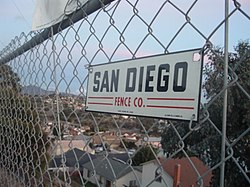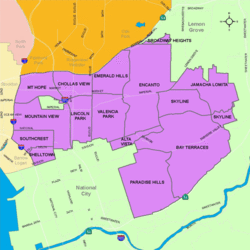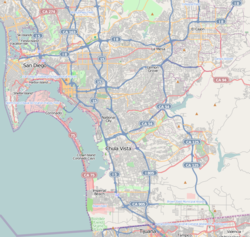Bay Terraces, San Diego
Bay Terraces, San Diego
North Bay Terrace, South Bay Terrace | |
|---|---|
| Bay Terraces | |
 Bay Terraces, as seen from Division Street | |
| Nickname(s): "P.H.", "Skyline Park" (geographically inaccurate but widely used due to proximity with bordering Paradise Hills and Skyline, the latter attributed to long-held territorial relations with the Skyline East Side Pirus)[1] | |
 Bay Terraces is located in the southeastern area of the city of San Diego | |
| Coordinates: 32°41′26″N 117°02′25″W / 32.690425°N 117.040358°W | |
| Country | |
| State | |
| County | |
| City | |
| Area | |
• Total | 8 km2 (3.1 sq mi) |
| Population (2019) | |
• Total | 29,419[2] |
| • Density | 3,786/km2 (9,806/sq mi) |
| ZIP Code | 92114 and 92139 |
Bay Terraces is a hilly urban neighborhood in the southeastern part of San Diego, California, United States.[3] A composite of North Bay Terrace and South Bay Terrace,[4] it is bordered by Skyline to the north, Paradise Hills to the southwest, Alta Vista, South Encanto and National City to the west. The southern end of the neighborhood is bordered by State Route 54 and Bonita. The neighborhood generally includes the ZIP Codes 92114 and 92139 and as such, parts of the area have often been incorrectly referred to as either "Paradise Hills" (adjacent to South Bay Terrace) or "Skyline Hills" (adjacent to North Bay Terrace) due to its proximity and overlapping ZIP Codes.[5][6] Nevertheless, Bay Terraces is the largest neighborhood in the Skyline-Paradise Hills Community Planning Area.[7]
History
[edit]The neighborhood was annexed by San Diego in 1969. In 1976 and 1977 Peñasquitos, Inc, submitted revisions to the initial 1969 Plan, including adjustments to housing, open space, and circulation, resulting in the development and urbanization of Bay Terraces.[8] Hence, from the late 1970s to early 1980s, in the interest of urban renewal, this massive, unused tract of land (formerly a canyon) between the Skyline and Paradise Hills neighborhoods underwent development. This tract would eventually become Bay Terraces. The notion of a new subdivision built directly triangulated in what were already considered high-crime areas repelled the great majority of home-buyers. The homes were also priced out of the range of typical residents of the area and most went unsold or, in some cases, unbuilt. Federal subsidies and economic programs were then employed to assist in completing and populating the subdivision. As a result, military personnel, Filipino immigrants with military ties, and low-income families were able to secure loans to buy the new homes in the area. The federally funded recovery project was only marginally successful, however, as several large portions of the development stood partially constructed and abandoned for nearly twenty years, the most noticeable example at the intersection of Skyline Dr. and Woodman Ave.[9][10]

With the great influx of Filipino immigrants joining the United States Navy,[11] especially from the Vietnam War era on to the 1990s, many Filipinos inhabited the Southeast San Diego neighborhoods of Alta Vista, Bay Terraces, Paradise Hills, Shelltown, Skyline Hills, and Valencia Park, both for the relatively affordable housing prices and its close proximity to Naval Base San Diego.[12]
At present, Bay Terraces remains home to a significant Filipino American population.[13] In 2015, a bridge on the south edge of the neighborhood was named for Larry Itliong and Philip Vera Cruz.[14] Also in 2015, a Filipino American was sentenced to over 50 years in prison for his role in a 2010 shooting and death of a San Diego Police Officer, although he was not the person who shot the police officer.[15]
Geography
[edit]Bay Terraces takes up a little over 40% of the 4,500 acres that make up the Skyline-Paradise Hills Community. Much like the surrounding neighborhoods of Skyline, Paradise Hills, and Jamacha-Lomita, the area is composed predominantly of low-density single-family homes spread across the hilly area. A major geographic feature is Paradise Valley, which runs on an east–west axis through the middle of the community and gives rise to the Paradise Creek, which flows into San Diego Bay. Paradise Valley Rd itself splits Bay Terraces up to North Bay Terrace and South Bay Terrace.[16]
Demographics
[edit]
Bay Terraces has a diverse population spread across its 31,896 residents. The population density was 9,806 per square mile (3,786/km2). The racial makeup of Bay Terraces was 2,883 (9.1%) non-Hispanic White, 3,902 (12.4%) African American, 14,000 (44.3%) Asian (the overwhelming majority of which are of Filipino descent),[17] 1,434 (4.5%) from two or more races and 485 (1.5%) from other races. Hispanic or Latino excluding black and Asian Hispanics was 8,846 persons (28.1%).[18] It ranked 101 out of 125 San Diego neighborhoods in terms of lowest percentage of non-Hispanic whites, and 24 out of 125 San Diego neighborhoods in terms of total population that is non-White (roughly 90%).[19]
Image
[edit]Commonly seen across Southeast San Diego, many homes in Bay Terraces are tract homes built in the late 1970s to early 1980's that have been outfitted with iron bars over the ground-floor windows and doors, as well as cast-iron gates and chain-link fences guarding driveways, a reflection of the perceived need for security in these historically high-crime urban neighborhoods.[20] Additionally, it is home to the sprawling Meadowbrook Apartments, an expansive low-income housing project which has long been plagued by drug sales, violence, and homicides.[21][22] The area in and around the Bay Terraces complex has been the target of several law enforcement operations and sweeps, targeting the Skyline East Side Piru gang in particular, believed to be one of the largest Blood gangs in San Diego.[23] Hundreds of members of the gang have been arrested as a result of these periodic sweeps since 1990.[24] The 22-acre, 448 unit complex recently underwent an extensive renovation by Seattle-based Vitus Group, which purchased the housing projects in 2013 and completed upgrades in 2015.[25]
In 2000, it was ranked the 19th safest neighborhood in San Diego.[26] Over the past two decades, Bay Terraces has averaged roughly a homicide a year, with 2004 accounting for an especially high four homicides out of the city's 62 total for that year, which led all city neighborhoods, followed by bordering Skyline, and nearby Mountain View and Logan Heights, which each had three apiece.[27]
More recently in 2019, sections of Bay Terraces recorded the greatest percentage increase in violent crimes during a five-year period reviewed by the San Diego Union-Tribune. The census block, from Paradise Valley Road to just south of Shadyglade Lane along South Meadowbrook Drive saw violent crime reports increase 450 percent. For the entire five-year period, there were 51 reported violent crimes, or about one every five weeks in just those few blocks alone.[28]
Government
[edit]The neighborhood is within the 4th City Council District.[29] The district has long been represented by Myrtle Cole since she won a special election in 2013 through 2018.[30] It is currently represented by Monica Montgomery Steppe, who assumed office in 2018.[31] Federally, the neighborhood is within the California's 53rd congressional district, where 14% of the voting population within the district is Asian American.[32]
Education
[edit]Bay Terraces is served primarily by San Diego Unified School District along with some charter and private schools. Schools that serve Bay Terraces students include Morse High School in neighboring Skyline, O'Farrell Community School, an independent charter school located in nearby O'Farrell Park, and Bell Middle School in South Bay Terrace.
Much like the rest of Southeast San Diego, many students in Bay Terraces have taken advantage of San Diego Unified School District's Voluntary Enrollment Exchange Program (VEEP), and have opted to be bused to high schools in San Diego's more affluent northern suburban neighborhoods,.[33] Depending on their VEEP Allied School Pattern, a high school student may be voluntarily bused to Mira Mesa High School, Mission Bay High School, Scripps Ranch High School, Serra High School, and University City High School.[34]
References
[edit]- ^ "Skyline Piru (San Diego)". United Gangs. Retrieved 2020-11-21.
- ^ "Bay Terraces Demographics". Point 2 Homes. Retrieved 2020-11-17.
- ^ Laura Roberts (1 February 2017). San Diego de A a Z. Buttontapper Press. p. 44. ISBN 978-1-5071-6512-6.
- ^ "Communities". City of San Diego. Retrieved 2020-11-17.
- ^ Skyline-Paradise Hills Community Profile (City of San Diego: Planning Department)
- ^ "Bay Terraces Demographics". Retrieved 2020-11-17.
- ^ "Community Profiles: Skyline-Paradise Hills". City of San Diego. Retrieved 2020-11-18.
- ^ "Skyline-Paradise Hills Community Plan" (PDF). City of San Diego. Retrieved 2020-11-25.
- ^ Leland Fetzer (2005). San Diego County Place Names, A to Z. Sunbelt Publications, Inc. p. 9. ISBN 978-0-932653-73-4.
- ^ "Skyline-Paradise Hills Community Plan" (PDF). City of San Diego. Retrieved 2020-11-25.
- ^ "Journal of San Diego History". Retrieved 2007-11-17.
- ^ "San Diego Reader - Their Own Paradise". Retrieved 2020-11-17.
- ^ Judy Patacsil; Rudy Guevarra, Jr.; Felix Tuyay (2010). Filipinos in San Diego. Arcadia Publishing. p. 8. ISBN 978-0-7385-8001-2.
Anatalio Ubalde (1996). Filipino American architecture, design, and planning issues. Flipside Press. p. 129. ISBN 9780965808309.
Dillon, Liam (12 March 2013). "Long on Numbers, Short on Clout in D4". Voice of San Diego. Retrieved 4 October 2017.
"Weekly Update" (PDF). City of San Diego. 11 May 2016. Retrieved 4 October 2017.For nearly three decades, the Bay Terraces Filipino-American Seniors Association has gathered at the Bay Terraces Community Park, affectionately known as Tooma Park, to engage in daily activities including dancing and socializing, building camaraderie and a community. Today, the group has well over 300 members.
- ^ Guillermo, Emil (18 December 2015). "California School to Bear Names of Filipino-American Labor Leaders Itliong, Vera Cruz". NBC News. Retrieved 4 October 2017.
"Six of Weber's 2014 Bills Signed by Governor". Assembleymember Shirley Weber. California State Assembly Democratic Caucus. 13 October 2014. Retrieved 4 October 2017.Designates the overpass on South Woodman Street that crosses State Route 54, also known as the Filipino American Highway, in the City of San Diego as the Itliong-Vera Cruz Memorial Bridge.
Ardis, Kelly (1 September 2015). "Filipino-Americans: The forgotten leaders of '65 grape strike". The Bakersfield Californian. Bakersfield, California. Retrieved 4 October 2017. - ^ Perry, Tony (19 September 2015). "Murder conviction upheld in shooting death of San Diego police officer". Los Angeles Times. Retrieved 4 October 2017.
Krueger, Paul; Stickney, R. (23 September 2013). "Convicted Cop Killer to Spend Decades in Prison". KNSD. San Diego. Retrieved 4 October 2017.
Pimentel, Joseph (14 September 2013). "Fil-Am convicted for cop's murder in San Diego". Asian Journal. Northern California. Retrieved 4 October 2017.
"2 Fil-Ams plead not guilty to San Diego cop's murder". GMA News. Philippines. 14 August 2011. Retrieved 4 October 2017. - ^ "Skyline-Paradise Hills Community Plan". Scoutred. Retrieved 2020-11-25.
- ^ Judy Patacsil; Rudy Guevarra, Jr.; Felix Tuyay (2010). Filipinos in San Diego. Arcadia Publishing. p. 8. ISBN 978-0-7385-8001-2.
- ^ "Race and Ethnicity in Bay Terraces, San Diego, California". Statistical Atlas. Retrieved 2020-11-17.
- ^ "Race and Ethnicity in Bay Terraces, San Diego, California". Statistical Atlas. Retrieved 2020-11-17.
- ^ "On the street. Fighting crime in some of San Diego's toughest neighborhoods". Retrieved 2007-11-22.
- ^ "Bay Terraces: Symptoms of a greater problem". Baltimore Sun. 2019-03-28. Retrieved 2020-11-17.
- ^ "Killer of S.D. Officer Slain After Manhunt: Shootings: Young officer was gunned down as he stepped from his car. His killer was slain 11 hours later". Los Angeles Times. 1991-09-18. Retrieved 2020-11-19.
- ^ "Released from Pelican Bay to San Diego with $200". San Diego Reader. 2012-11-07. Retrieved 2020-11-18.
- ^ "96 Crips, Bloods Arrested During 'Red Rag' Sweep : Gangs: Police round up gang members on drug charges in sequel to "Operation Blue Rag."". Los Angeles Times. 1990-11-30. Retrieved 2020-11-18.
- ^ "Meadowbrook makeover pleases low-income tenants". San Diego Union-Tribune. 2015-03-27. Retrieved 2020-11-17.
- ^ CurtCo/SDM LLC (September 2004). San Diego Magazine. CurtCo/SDM LLC. p. 61. ISSN 0036-4045.
- ^ "Crime Statistics and Maps Automated Regional Justice Information System (ARJIS)" (PDF). Retrieved 2020-01-02.
- ^ "Bay Terraces: Symptoms of a greater problem". San Diego Union-Tribune. 2019-03-28. Retrieved 2020-11-17.
- ^ San Diego (Calif.) (2000). San Diego Annual Budget. City Manager. p. 895.
- ^ Bowen, Andrew (29 July 2016). "Councilwoman's Comments On Racial Profiling Spark Outcry". KPBS. San Diego. Retrieved 4 October 2017.
- ^ Garrick, David (November 7, 2018). "Cole, Zapf lose re-election bids in two rare instances of San Diego council incumbents being rejected". San Diego Union-Tribune. Retrieved November 17, 2020.
- ^ "A Community of Contrasts" (PDF). Union of Pan Asian Communities. Asian Americans Advancing Justice, Los Angeles. 2015. Retrieved 4 October 2017.
- ^ "VEEP Information". Archived from the original on 2007-12-10. Retrieved 2007-11-17.
- ^ "2007–2008 VEEP Allied Patterns" (PDF). Archived from the original (PDF) on 2008-05-02. Retrieved 2007-11-17.

